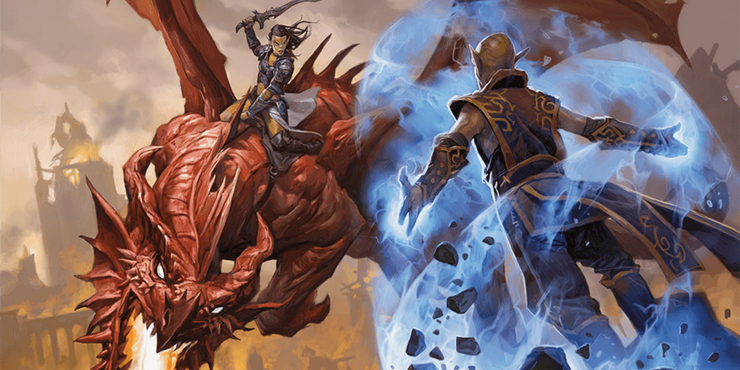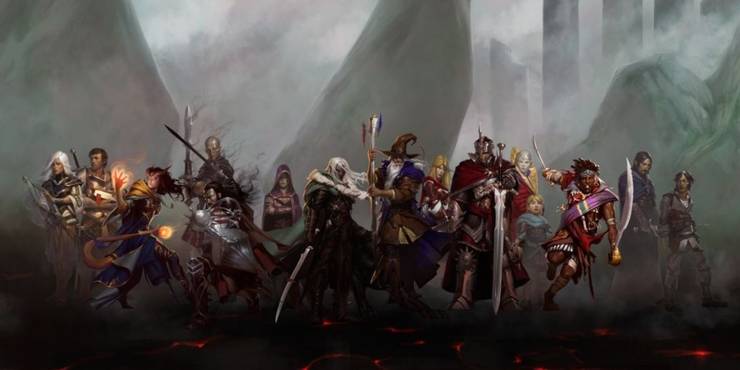The Epic Boon system is the fifth edition Dungeons & Dragons answer to epic-level gameplay. Boons are special powers only available to characters who have already reached the maximum level of 20. These allow the Dungeon Master to continue to offer character advancement and rewards in a campaign that continues after D&D characters reach the game’s level cap. Some of the boons are better than others, and the method for gaining boons will vary based on the DM’s preference of boons based on quest milestones or awarding them based on experience points.
Prior editions of D&D have taken different approaches to epic-level rules. The Basic D&D line handled this via the Immortals rules, while second and third edition D&D both had supplements for epic levels, allowing for levels beyond 20. Fourth edition D&D included epic play in the game’s core assumptions, with a three-tier system placing “epic levels” as 21 through 30. The fifth edition of D&D does not currently have any rules for levels that extend beyond 20, but epic boons serve a similar function.
The Dungeon Master’s Guide notes that Epic Boons can be granted by the DM to characters of level 20. This can be either after completing a major quest or other accomplishment within the campaign’s story (the milestone method) or for every 30,000 experience points the character earns beyond the amount needed for level 20 (the experience point method). The experience points are less than the final levels gained, rather, matching the experience costs to increase from levels 15 to 16, or 16 to 17. The Dungeon Master’s Guide also notes the DM selects the boon, although optionally they could allow the player to pick their own Epic Boons. The book suggests DMs might offer players the choice of a +2 stat boost or a Dungeons & Dragons Feat, options received during normal level progression, as an alternative to a boon.
D&D Boons Allow For Epic Advancement Beyond Level 20

For Dungeons & Dragons campaigns that extend beyond the level cap, players should take care in selecting their Epic Boons, if the DM allows them to do so, as some are more beneficial than others, and some are suited only to particular builds. Players should look to Boons that offer more advantages than a stat increase, or the multiple benefits of a bonus feat. Boon of Irresistible Offense is a good choice for any D&D character that deals damage, allowing them to bypass the damage resistance of any creature. Boon of Truesight is another generally useful Boon, as having the ability “always on” is a huge advantage in avoiding illusions and invisible attackers, while also saving on higher level spell slots or Truesight magic items that require attunement.
Characters with 11 or more Rogue levels may consider Boon of Skill Proficiency, which grants them proficiency in all skills, as the Rogue’s Reliable Talent feature allows them to treat all d20 rolls of 9 or lower as a 10 for skills they are proficient in. Boon of Speed is an excellent choice for any melee character in Dungeons & Dragons, as it increases their movement speed by 30 feet, which could stack with Haste or similar effects, as well as spells and items that grant a swim or climb speed equal to the character’s base movement speed.
Spellcasters should look to boons that offer added access to D&D’s powerful level-9 spells, normally tightly restricted to a single casting per day under the basic rules of the Player’s Handbook. Boon of High Magic provides an additional level 9 spell slot to characters who already have one. Boon of Spell Recall allows a spellcaster to cast a spell without expending the spell slot, once per long rest. These combined allow for three castings of level 9 spells per day, which include game-changers like Foresight; granting advantage to nearly every roll a character makes, and disadvantage to enemies attacking them, for eight hours.
Other D&D Boons offer benefits duplicating feats, like Boon of Fortitude, which grants 40 additional Hit Points, equal to the amount granted by the Tough feat for a level 20 character. Some boons function once per short rest and mirror class features, as Boon of Combat Prowess’ automatic hit with a missed melee attack once per short rest is functionally similar to the Rogue level 20 capstone Stroke of Luck. While some of these are recommended as lower priority choices than top tier boons noted previously, they could provide synergy for themed builds, such as a character with the Lucky Feat taking Boon of Fate and Boon of Luck to portray a supernaturally fortunate character with numerous ways to stack D&D’s odds in their favor, and against their enemies.
Dungeon Masters Will Need To Carefully Balance Epic Boons

Dungeon Masters running truly epic games can make good use of boons. Giving the choice of boon to the player is likely the best approach, as it gives them agency over their own character, and to keeps them excited for the D&D campaign. If the game leading to level 20 used experience points for advancement, boons should continue to do the same, for consistency, where campaigns that offered levels based on milestone advancement should carry on with milestones for boons.
As D&D boons offer less than a character level, which includes a number of statistical increases, like hit points and proficiency bonus scaling, as well as class features, DMs using milestones should pace the games to offer boons more quickly than level advances from levels one to 20. For DMs using experience to determine Epic Boon progress, they will likely note a brisk rate of advancement, as the experience points associated with encounters designed to challenge a party of level 20 characters should meet the 30,000 needed for a Boon in relatively short order.
While Epic Boons solely offer perks and the added satisfaction of advancing a character beyond the normal maximum, on the player side, Dungeon Masters will need to take special care in running an epic game of fifth edition D&D. Boons add additional power which can be hard to gauge on normal challenge rating encounter calculations, so DMs will need to make adjustments over time to ensure encounters are challenging, but not unbeatable. Adding boons on top of the already complex and numerous options available to level 20 characters, as well as the various magic items they likely possess, mean the party is capable of a great deal in such a game. All but the most seasoned players may have trouble remembering and properly using all of their abilities and features, Boons included. The DM should start slow with epic level Dungeons & Dragons, giving the players some time to enjoy the power of Epic Boons and become acclimated to their new powers, before they begin to increase the challenge.
About The Author



